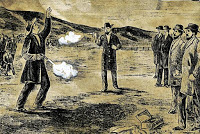Two twin granite shafts stand
at the southern tip of Lake Merced in the southwestern part of San Francisco.
One of these stones bears the
name Terry in bronze letters, its twin
bears the name Broderick again in
bronze letters.
A duel that occurred between
these two men resulted in a haunting.
 |
| Justice Terry SF Public Library and History Center. |
U.S. Senator David C.
Broderick was fatally wounded on this spot when California’s ex- Supreme Court
Chief Justice David S. Terry challenged him to a duel, in the mid-1850s.
This duel was the result of a
bitter struggle that was occurring within the state’s Democratic Party—over the
hotly debated issue of slavery.
Justice Terry was the
privileged son of a Kentucky family who made their fortune and prospered
because of slave labor.
He wore fine clothes and was
an educated gentleman, and was pro-slavery.
 |
| Senator Broderick SF Public Library and History Center |
In contrast, Senator
Broderick was the son of a stonemason. He did not wear fine clothes or have
fancy manners. He had been baptized into politics via New York City’s rough
Tammany Hall.
He was a friend of the civil
rights activist leader, Frederick Douglass. He was firmly against slavery.
Broderick and Terry were originally
good friends and allies in the Democratic Party, but when the issue of slavery
became a hot topic, their relationship changed.
When Terry was not re-elected
he publically blamed Broderick. This resulted in a bitter, accusatory battle
between the two.
Justice Terry attacked
Broderick for socializing with African-Americans, and for his advocating for
freeing the slaves.
Senator Broderick hit back
defending his beliefs and then questioned Terry’s judgment, ethics, and
ancestry.
Terry then challenged
Broderick to a duel. Broderick accepted, knowing he would be marked a coward if
he didn’t.
At dawn, on September 13,
1859, the two men stood 10 yards apart near Lake Merced.
Belgium .58 caliber pistols
were used. Both men were excellent marksmen, but Terry had practiced with one gun
the day before—Broderick hadn’t.
Both pistols had
hair-triggers but Broderick’s gun was more delicate and his seconds, inexperienced,
did not grasp the significance of this difference.
Broderick fired first—but the
gun fired as he raised his arm, and his bullet hit the ground near Terry.
After his death, 30,000 people crowded into Portsmouth Square to listen to Broderick’s funeral oration.
Several witnesses to this
duel were outraged and accused Terry of tampering with the pistols. He was
arrested and put on trial, but the case was dismissed.
After Broderick’s death, a public and
legislative outcry resulted in duels being outlawed. This is why this case is
known as “The Last Notable American Duel.”
Eighteen months after this
duel, American’s were fighting the Civil War to decide the issue of
slavery.
Broderick’s ghost has been seen in various places.
One story states Broderick is
still standing up for racial equality. His ghost has been seen joining civil
rights demonstrations and marching.
His ghost is also seen on
foggy fall mornings, near the spot where he lost his life. He is seen shooting
into the ground and then clutching his chest in agony. Finally, he is seen collapsing to the ground.
Most who have seen his ghost
near the lake were not aware of this history.
 |
| The two granite obelisks mark where each man stood. Photo: The BrokenlnaGlory |
The site where Broderick was
wounded, is a registered California Historical Landmark.
The pistols that were used in this duel were auctioned off in San Francisco in 1998 for $34,000.
 |
| SF Public Library and History Center |


No comments:
Post a Comment